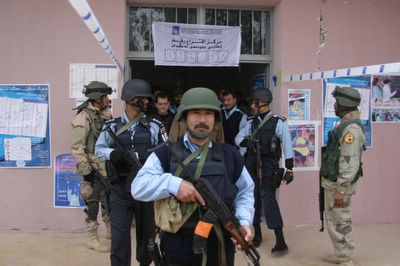
Iraqi and US troops outside an election polling booth (courtesy Matt Sherman)

I spent the morning in a meeting with an Iraqi officer and a tribal leader from al Anbar. That's a pretty typical situation. There's always more to it than straight up work, though. I'm not referring to the pleasantries that go on for hours, but rather to the personalities.
Take, to start with, the Iraqi officer. He has a couple of quirks. The first is his apparent belief that "never mind" means "ok". Sometimes this is comforting:
"We're out of coffee."
"Never mind."
Sometimes it's mystifying:
"Let's get in the helicopter now."
"Never mind."
Sometimes it's even frustrating:
"You need better communications or people will get killed."
"Never mind."
…His other quirk is a tendency, whenever put in a corner, to break out of that corner by delivering a diatribe about how extreme our military measures should become. "You are too soft. Whenever someone shoots at you, you should destroy their house and kill everyone in it and arrest their families, etc, etc."
So, it's this guy in the blue corner. And in the red corner is the Sheikh. Behind him, clad in their flowing dark robes (all of which have at the bottom a trim that repeats in small golden letters the distinctly incongruous words "Yorkshire Wool") sit the sub-Sheikhs of his tribe. They are all right out of central casting, sitting languidly, smoke drifting upwards from impossibly short cigarette stumps. But there was something about the head sheikh that marked him out. He looked like his grandfather, if you see what I mean. Rather than an Arab-looking man, peering out from the robes were a pair of piercing blue eyes and a brushy brown mustache, set against a pasty, slightly chubby, face. The British were in Iraq from the early 1900s until the 1940s, and, within 100 miles either direction of their main base at Habbaniyah, they left a lasting mark. A large percentage of the men from the Ramadi-Habbaniyah-Fallujah corridor have sparkling blue eyes. Sitting before me was a man who, sixty years ago, could have been no one other than Squadron Leader Algernon Fotherington-Smythe, or something like that, except wearing a headdress.
In any event, the meeting progressed, with greeting-countergreeting being followed by point counterpoint. It was in Arabic, and I'm not yet good enough to keep up with everything. During the conversation there were some sharp statements made, accompanied by broad hand gestures. As they sat there, wagging fingers across the table at each other, I interpreted in my mind.
"I say old chap, we simply must maintain tribal integrity, eh what!"
"Never mind."
But my satiric smirk turned to a real smile when I noticed that these sharply pointing fingers both shared one key similarity.
They were both dyed blue. (both had voted in the election -Ed)
-----------------------------------------------------------
I was driving a senior Iraqi general home this evening. When we got to his apartment complex it was barred by American soldiers. No one could come in or out. After a lengthy and somewhat heated discussion with the soldiers, they finally caved and let me drive him in. But think about that. American soldiers are blocking an entire little neighborhood of Baghdad, guilty of nothing worse than living in a sensitive area, from leaving their homes between 6pm to 6am. Again, I see the point. But I don't see the justice or sense in holding people prisoner in their own homes, especially not when those people include the leadership we expect to work with us and take over from us on security issues.
With my second example, I see neither the point nor the justice. Many facilities in Baghdad are guarded by Iraqi contractors, hired and overseen by American security companies. I happen to work in one such complex. The American company we've contracted our security to has decided that the more than 200 Iraqis who work here are not allowed to leave for the next five days. This, in effect, denies them their right to vote. An American corporation is stopping Iraqis from voting. That's simply outrageous. The Iraqi security guards are very disappointed. BC and I are going to fight this one – we've got a couple of minibuses and we're going to shuttle the Iraqis to and from the polling centers. Right now we're raising it with that company's corporate leadership in country. If they say no – we'll do it anyway!
A final example, albeit not from tonight. I was driving recently in the Green Zone, when I saw ahead of me a convoy of HMMWVs (unfairly maligned vehicles for technical reasons I'm glad to discuss). There was a sign on the back of the rear HMMWV, but I couldn't read it, so I kept accelerating to overtake them. It was only when I was about 25 yards behind the tail vehicle that I could finally read the bilingual sign. It said "STAY BACK 300 METERS OR DEADLY FORCE WILL BE USED"
We were in the Green Zone so I was ok, but I felt a flash of great anger on behalf of the innocent Iraqi civilians who could so easily fall afoul of such a shortsighted (literally!) message.
It's a factor, I think, of having been here for quite a while now, that I often see things more from the Iraqi perspective than from the American one. Maybe it's a variation of Stockholm syndrome, I don't know! :) And don't get me wrong, I'm fully in support of what we're doing here. I just wish we'd do it with a bit more tact and humility. Don't get me wrong on this either - I know who the real villains are, and I believe most Iraqis do as well. It's just a function of really wanting this all to work that the little things we do wrong frustrate me so much.